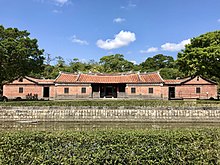About Jhudong Old House
Jhudong is located in the center of Ab Hsinchu County and has long been blessed with water resources, with the Shangping and Touqian Rivers flowing to the east. It was only gradually that Jhudong developed into a major Hakka settlement in Hsinchu County.
There is also an old temple, the Huichang Temple, built in 1821, which is a curving temple dedicated to a Hakka temple revered by Hakka immigrants. This temple enshrined the Three Mountain Kings, who were worshipped by Hakka immigrants, and was the center of worship for the residents of Jhudong.
When Peng Guilai developed Jhudong, he built five houses and divided them among his five sons. Xin Hao Di, located at No. 111, Sec. 3, Dongning Rd. is inconspicuous, sandwiched between various concrete buildings, but its well-preserved courtyard is filled with ancient meanings, such as wood carvings and cross-shaped ceramics. Originally an earthen corner house, Xin Hao Di was later converted into a fusion of Chinese and Western architecture, rebuilt by the famous Taipei craftsman Feng Li and carved by his master, a Guanhua man. The wood carvings are fine but not showy, and the clay work is colorful but not gaudy.
Entering Kangning Street from Dongning Road, you will find the Upper Longxi Hall and Lower Longxi Hall. The Upper Longgye Hall on Lane 135 was the residence of the second son of Peng Guilai, and was originally a triple courtyard building with swallow-tails, but due to its age, the dragon guard on either side was changed. To distinguish it from the former, the locals called it Shimoryu-kei-den. The house is large in scale, and the main hall and the left and right guardian dragons in particular use different types of ma shang style, such as wood, water, fire, and earth, showing a simple yet precise beauty and showing the care that went into its construction.
The Su Mansion Wugong Hall, located at Lane 103, Section 3, Changchun Road, was built by a descendant of the Su family in Ningzhou, Fujian Province. It is a magnificent building with an area of over 1,000 pings, a triple courtyard with three dragon guards on either side, and two walls outside the courtyard. Although close to the road, the courtyard is quiet and peaceful, with flowers and trees, and the constant sounds of insects and birds. “Birdsong” and “Scent of Flowers” inscribed on the windows on either side of the main hall, as well as “Listen to the Song of the Warbler” and “Watch the Crane Dance” in the foyer, make the setting even more elegant.
How to get there
1、Take Neiwan Branch Line from Hsinchu Station, get off at Jhudong Station, turn right at Donglin Road and take Changchun Road Section 3 to go to Xinhaodi and Wugong Tang. From Changchun Rd. Sec. 2, turn right at Xingnong St. and Kangning St. to Upper and Lower Longxi Agency.
2、Take the Hsinchu Bus from Hsinchu Railway Station to Jhudong, or take the TBA Bus from Taipei TBA North Station to Jhudong.
Note: All old houses in Jhudong are currently occupied by descendants, so please be quiet when visiting.
Tips
The Huishang Temple is a representative Hakka temple built during the Daoguang period of the Qing Dynasty and is still very well preserved. It enshrines the Three Mountain Kings, who are worshipped by the Hakka people, and is the religious center of the entire Jhudong region. The Peng family was the wealthiest family in Jhudong, and Peng Hailao built five houses for his five sons, leaving Xinhaodi and Longxidang. Xinhaodi is also a very traditional courtyard house with excellent wood carvings, which was later converted to Chinese and Western style buildings.


